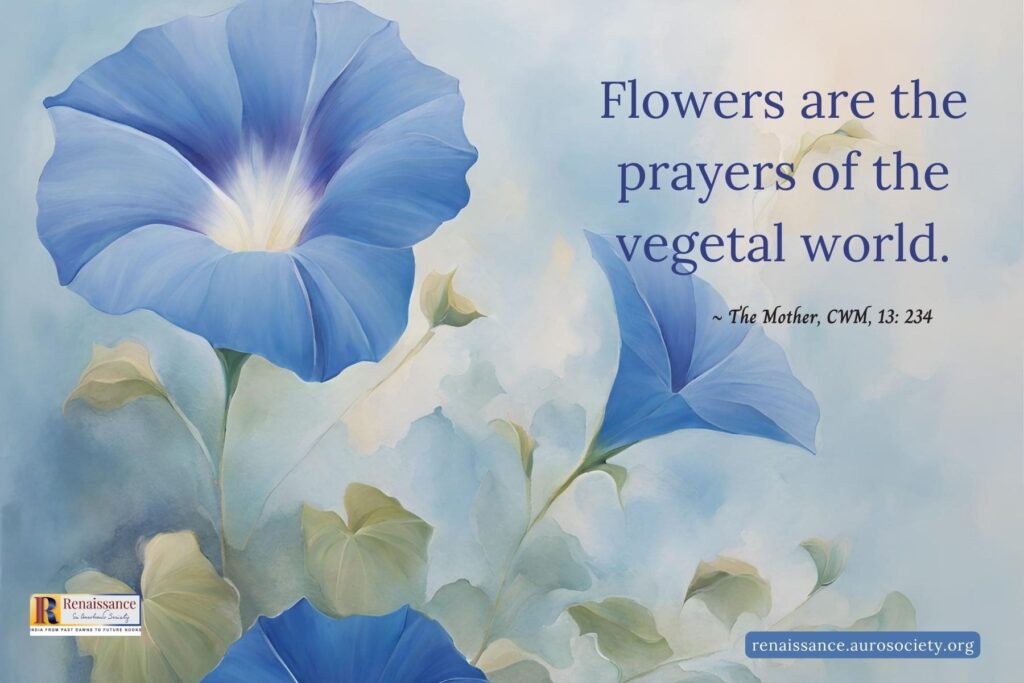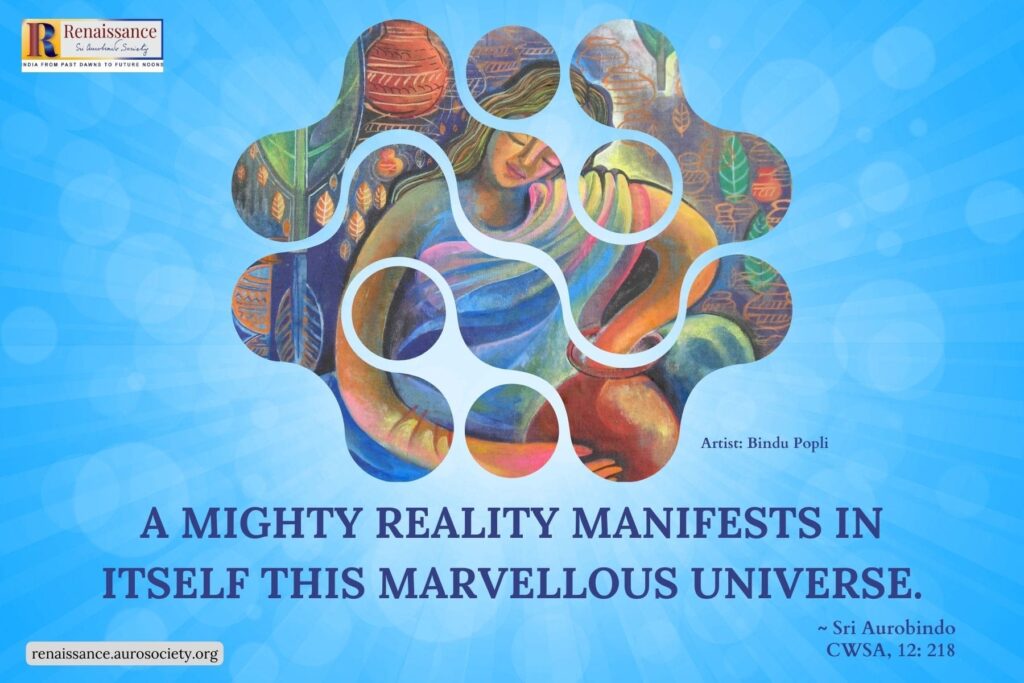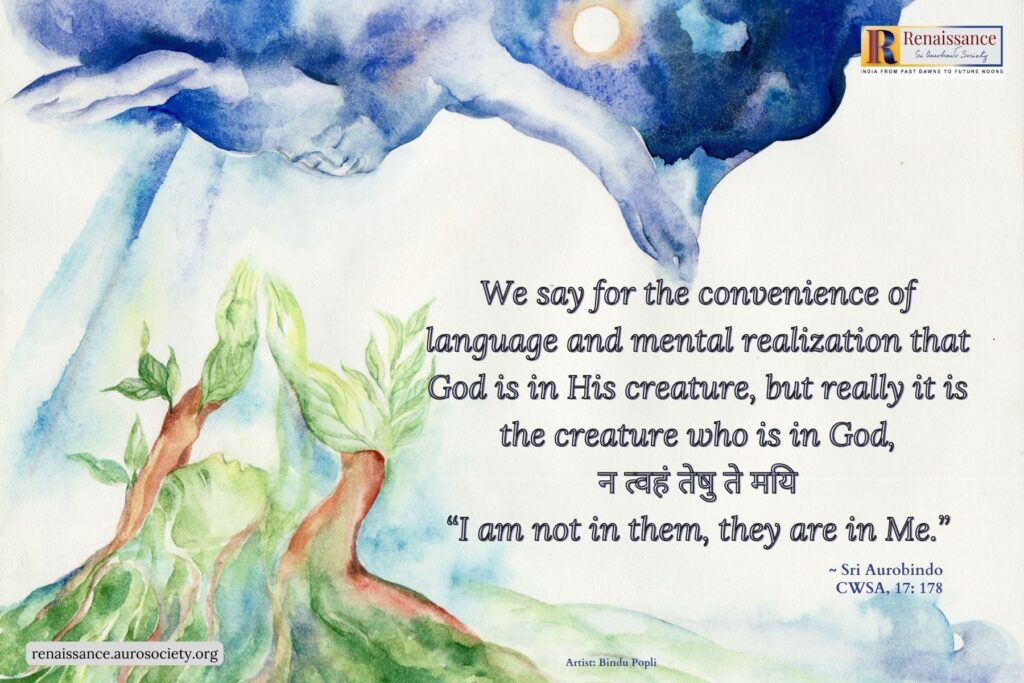Editor’s note: In our Book of the Month feature, we present some relevant excerpts from Kishor Gandhi’s significant book titled, ‘Social Philosophy of Sri Aurobindo and the New Age.’ The following extracts are taken from the 1991 edition published by Sri Aurobindo Ashram Trust, pp. 367-372. We have made a few formatting revisions for the purpose of this digital presentation.

In July 1960, the author had submitted a brief synopsis of his lectures on the subject of the Family to the Mother for approval before taking up for teaching it in the Sociology class of the Higher Course of Sri Aurobindo International Centre of Education.
In the synopsis he had mentioned that in the view of some of the contemporary social thinkers the modern Western family had now become so insecure that it was likely to break down in the near future. The Mother while seeing the synopsis asked for information as to what he was going to say on this point.
She also remarked that in her view the breakdown of the family “was, and is still, an indispensable movement to bring humanity to a higher and broader realisation.”
The author prepared for the Mother’s information a brief note on the recent developments in the modern family which were considered likely to bring about its breakdown, and also put some questions to her apropos of her above remark.
The Mother read the note and answered the questions. This note is given below followed by the author’s questions and the Mother’s answers. [. . .]
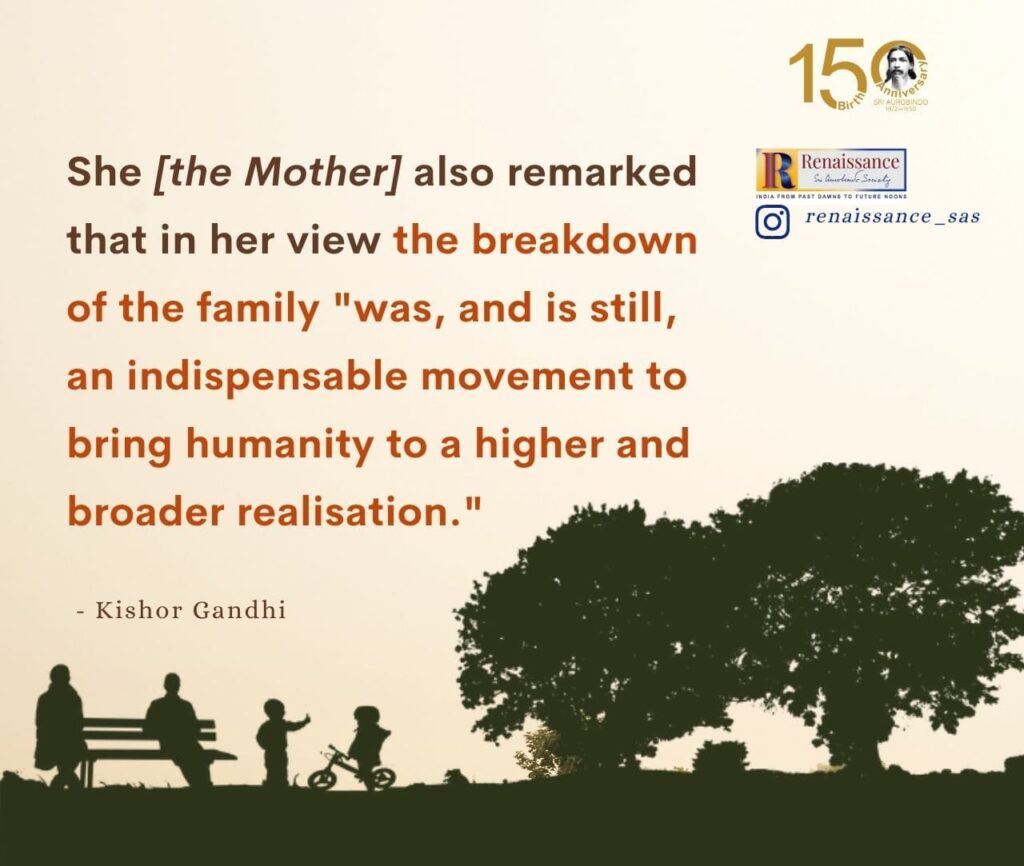
A Brief Note on the Modern Family
Certain developments in modern times in the family system, especially in the Western European countries, have made it so very insecure that it has led some contemporary social thinkers to conclude that this system will in the near future disintegrate and disappear. These developments are briefly stated below.
The family system which prevailed in Western Europe until about the nineteenth century was the “extended” patriarchal system of the feudal times. It was entirely of an authoritarian type in which the male family head wielded almost complete authority in all matters. And the woman was altogether subordinated to him. She had hardly any political, legal or property rights of her own and was mostly treated as a “minor” or a “ward.” This authority of man over woman was supported by the Church and the State and the cultural traditions of the western society.
This patriarchal family was also an economic unit, owned and managed by the male family head. Besides the economic functions it also performed a large number of other functions — political, religious, educational, cultural, etc. It was thus a multi-functional group.
This system was subjected to very powerful influences in the nineteenth century. The Industrial Revolution not only radically revolutionised the economic structure of the Western society but also transformed in a brief period the entire social order. These influences, combined with the new democratic trends of the modern age, swiftly undermined the authoritarian traditions in the State and the Church and also in the family system.
As a result, the domination of the male family head over his wife and children was considerably decreased. At present in a number of European countries women have almost equal social, political, legal and property rights as men. The same equalitarian trend is powerfully operating in all the other European and Asiatic nations where the women’s status still remains inferior to man’s.
Also a large number of economic and other functions which the Western family used to perform before the modern period have now been taken over by other social agencies which perform them with greater efficiency and more economy. The factory, the school, the hospital, etc. have taken over the productive, educational and nursing functions formerly carried out within the family. And even the household functions like laundering, preserving and baking, and in some measure even cooking and cleaning, are now more and more passing out into the hands of specialised agencies outside the family.
One important result of the transfer of these functions has been the reduction of the size of the earlier “extended” family. The economic activities of the family no longer require the assistance of relatives and married children, hence there is no need for their staying in the household.
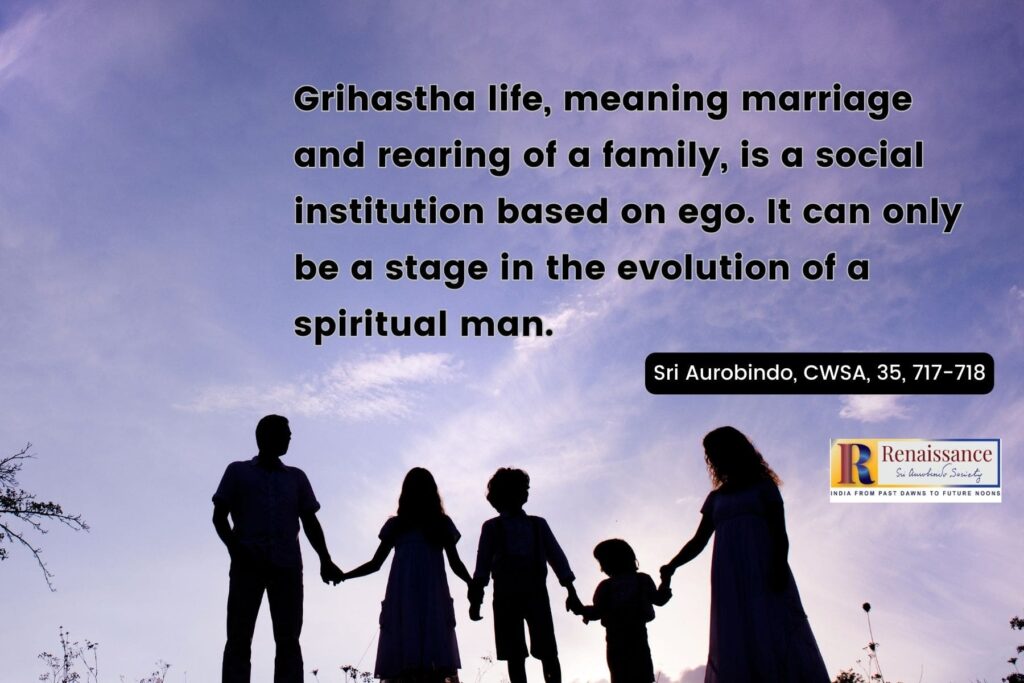
This contraction in the family size is further increased by the widespread use of contraceptive devices. The use of these devices for prevention and reduction of children has considerably reduced the burden of parental functions in the modern family. And even this reduced burden is further lightened by the growth of various social agencies like the maternity hospital, the baby clinic, the crèche, the kindergarten and the “baby-sitter.”
The only functions that still remain with the small modern urban family are the satisfaction of the sex-impulse, the need for companionship, the desire for children and the provision of home comforts. It is on these functions that the continued existence of family depends. But it is becoming evident that even these functions are not satisfactorily fulfilled by the present family system.
Several recent investigations have proved that there is widespread discord and unhappiness in the family, as attested by the increasing number of divorces, separations and desertions. Formerly the family was held together by several bonds. Now only a few bonds remain. And they too are subjected to such extreme strains that they might snap.
These developments have led some social thinkers to conclude that the modern family has hardly any important functions left to perform. And, therefore, it will wither away in the future. They are afraid that it will break down and disappear as there is no justification left for its existence. All of them do not consider such a breakdown to be an undesirable thing. There are others, however, who believe that the functions that still remain with the family are sufficiently important and durable to prevent the family system from completely disintegrating in the future. And that it will survive in some modified form.
Also read:
Relation between Men and Women in Yoga
The Mother’s Answers to Questions on the Future of the Family
In reference to the view of some modern social thinkers expressing fear of the possible breakdown and disappearance of the family system, you have remarked that this breakdown “was, and is still, an indispensable movement to bring humanity to a higher and broader realisation.”
This raises some important questions which I state below for your clarification:
- Do you consider this dissolution of the family system indispensable only for the few exceptional individuals who follow some high mental or spiritual ideal or also for the general humanity?
“Yes, only for the few exceptional individuals who follow some high mental or spiritual ideal.”
- If you advocate a complete dissolution of the family system for the entire humanity, do you consider it advisable to happen even before the new process of birth by direct materialisation has been normalised on earth?
“More liberty and plasticity in the system are advisable — Fixed rules are harmful to evolution.”
- Do you also consider the abolition of the marriage system as equally indispensable as the abolition of the family system for the higher development of humanity? So long as the new process of birth has not been normalised, would not the present manner of sexual precreation continue? In that case, would not some form of marriage relationship be necessary?
“Marriage will always take place, but legal ceremonies must not be enforced, to avoid illegality.”
- So long as the new process of birth has not been normalised and the children continue to be born through the present sexual process, is not the family life and its atmosphere best suited to their upbringing, especially in their early formative years? The other alternative is to provide for their care and upbringing through some other agency, like the state nurseries, as was advocated by some communist thinkers. But this view has not found many supporters, for it has been realised that the tender and affectionate care which the young children need could best be provided only in the intimate atmosphere for the family home by the parents. If this is true, then for the sake of the young children at least, would not the family be necessary until the new method of birth becomes possible and normal in the future?
“Here also both things must be equally admitted and practised. There are many cases in which it would be a blessing for the baby to be separated from his parents.
“A minimum of rules.
“A maximum of freedom.
“All possibilities must have equal scope for manifestation, then humanity will progress more rapidly.”
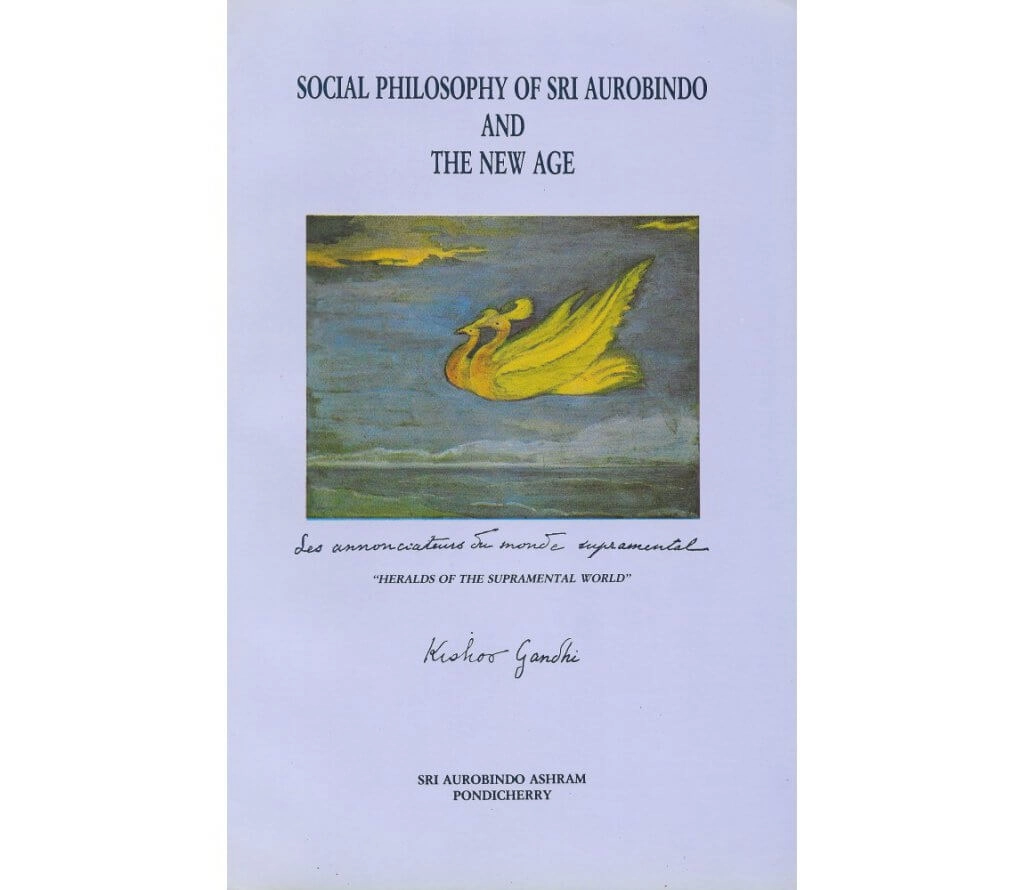
The book is available for purchase HERE.

~ Design: Beloo Mehra

